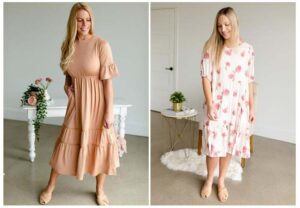
Have you ever experienced a moment where you put on your favorite outfit and instantly felt like a different person? The power of dressing goes far beyond just covering ourselves with fabrics; it has the ability to transform our mood, boost self-confidence, and project a unique image to the world around us. From ancient civilizations to modern-day society, clothing has always been an essential part of human expression, serving as a powerful tool for self-identity and communication. In this article, we will delve into the fascinating connection between dressing and personality, uncovering its psychological implications and shedding light on why what we wear truly matters in shaping who we are.
The Impact of Dressing on Personality
One’s clothing has the power to create a lasting impression and shape how others perceive them. It is often said that clothes maketh a man, and there may be more truth to this saying than we realize. The impact of dressing on personality cannot be overstated, as our choice of attire can convey important messages about our identity, confidence, and social status.
Our clothing choices communicate a great deal about who we are and what we value. For instance, someone dressed in bright colors and bold patterns might be seen as energetic and outgoing, while someone wearing neutral tones could be perceived as reserved and sophisticated. The way we dress also reflects our self-image; when we put effort into selecting well-fitted clothes that make us feel attractive, it boosts our confidence levels. Furthermore, the influence of dressing extends beyond mere perception – it can actually alter our mindset. Studies have shown that when individuals wear formal business attire, they tend to adopt corresponding behavioral characteristics associated with professionalism and authority. Conversely, casual clothing may elicit more relaxed or carefree attitudes. This phenomenon is known as enclothed cognition, where the symbolic meaning behind certain articles of clothing influences cognitive processes such as problem-solving skills or creativity.
Dressing Reflects Self-Expression and Individuality
The way we dress is a powerful form of self-expression. It allows us to communicate who we are, what we value, and how we want the world to perceive us. Our clothing choices reflect our personality, creativity, and individuality. When we dress in a way that aligns with our true selves, it can boost our confidence and make us feel authentic.
Dressing also allows us to stand out from the crowd and showcase our unique style. By choosing clothes that resonate with our personal taste, rather than following the latest fads or trends, we can create a sense of identity that is truly ours. It’s about embracing what makes us different and using fashion as a tool for self-discovery. Moreover, dressing reflects not only our inner self but also how society views us. Our attire can send subtle messages about our social status, cultural background, or profession without saying a word. Through clothing choices such as color schemes or accessories, individuals have the power to challenge societal norms or reinforce them.
Dressing Affects Others’ Perceptions
The way we dress has a profound impact on how others perceive us. Whether we like it or not, our appearance plays a crucial role in forming people’s initial opinions of us. Studies have shown that individuals who take the time to dress well are often seen as more confident, competent, and successful than those who do not. This is because dressing appropriately for a given situation demonstrates respect for oneself and others, showing that we care enough to put effort into our appearance.
Moreover, our clothing choices can also influence the level of respect and authority we command in professional settings. When we dress professionally, wearing tailored suits or polished dresses, we send a message that we take ourselves seriously and expect others to do the same. In contrast, dressing casually or sloppily may convey an impression of being laid-back or unorganized – qualities that are not typically associated with strong leadership skills. However, it is important to note that personal style should always be respected and embraced as a form of self-expression. While adhering to certain societal norms can enhance how others perceive us in specific situations, there should also be room for individuality and creative expression through fashion choices. Ultimately, dressing well is about finding a balance between conforming to social expectations while staying true to one’s own unique personality and style. After all, when we feel comfortable and confident in what we wear it translates into positive energy that radiates from within – leaving a lasting impression on those around us.
Dressing Boosts Confidence and Self-Esteem
Dressing is more than simply putting on clothes; it is a powerful tool that can transform our confidence levels and boost our self-esteem. When we dress in a way that makes us feel good, we project an aura of self-assuredness that affects how others perceive us. The right outfit can make us stand taller, walk with purpose, and exude an air of confidence that is impossible to ignore.
There is a psychological phenomenon known as enclothed cognition, which suggests that what we wear can actually influence our thoughts and behaviors. When we dress in attire that aligns with our desired image or persona, we start to internalize those attributes and act accordingly. In other words, when we dress like the person we aspire to be, it becomes easier to embody those qualities and conduct ourselves confidently. Moreover, the act of dressing thoughtfully allows us to express our individuality and creativity. It gives us the freedom to experiment with different styles and trends, helping us discover what resonates with our personality. This exploration fosters a sense of authenticity and self-acceptance because when we feel comfortable in our own skin – or rather, clothes – our confidence naturally flourishes. Dressing well isn’t about conforming to societal norms; it’s about embracing who we are and using fashion as a medium for self-expression.
Conclusion: The Power of Dressing in Personality
In conclusion, the power of dressing in personality cannot be underestimated. It is not just about looking good or following the latest fashion trends; it goes much deeper than that. Our choice of clothing has a profound impact on our self-image and how we are perceived by others. By carefully selecting our outfits, we can express our individuality, boost our confidence, and project a certain image to the world.
One interesting aspect of dressing is its ability to shape our mood and mindset. Studies have shown that what we wear can affect how we feel and behave throughout the day. Dressing in clothes that make us feel comfortable and confident can give us an instant mood boost, while wearing something unflattering or ill-fitting may put a damper on our outlook. Therefore, it is essential to pay attention to how different clothing choices make us feel and choose outfits accordingly. Furthermore, dressing in accordance with our personalities allows us to stand out from the crowd and make a lasting impression on others. When we dress authentically, rather than trying to fit into societal norms or follow trends blindly, we are more likely to attract like-minded individuals who appreciate us for who we truly are. Our style becomes a form of self-expression that communicates aspects of our personality without uttering a single word. Thus, dressing becomes a powerful tool for cultivating meaningful connections with others.
In conclusion, the power of dressing in personality goes beyond mere aesthetics – it influences how we view ourselves and how others perceive us.






Be First to Comment